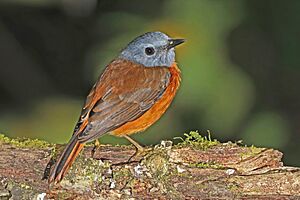Amber Mountain rock thrush facts for kids
The Amber Mountain rock thrush (Monticola erythronotus) is a beautiful songbird. It belongs to a bird family called Muscicapidae. This special bird is found only in one place in the world.
Quick facts for kids Amber Mountain rock thrush |
|
|---|---|
 |
|
| male, Montagne d'Ambre National Park | |
| Conservation status | |
| Scientific classification | |
| Genus: |
Monticola
|
| Species: |
erythronotus
|
| Synonyms | |
|
Pseudocossyphus erythronotus |
|
Where It Lives
The Amber Mountain rock thrush is an endemic bird. This means it lives naturally in only one specific place. For this bird, that place is Madagascar. It can only be found on the Amber Mountain massif in the northern part of the island.
What It Looks Like
This is a small bird that lives in forests. It grows to be about 16 centimeters (6.3 inches) long.
- Male birds are very colorful. They have blue heads, reddish-brown backs, and bright orange bellies. Their tails are also orange with brown feathers in the middle.
- Female birds are mostly brown. They have a bit of orange color on their bellies. Unlike the males, they do not have a blue head.
You can tell the males apart from other similar birds by their dark reddish-brown backs. The females are special because of their bright orange tails.
Its Home and Habits
This bird lives in humid, evergreen forests. These forests are found at middle to high altitudes. This means they are usually between 800 and 1,300 meters (2,600 to 4,300 feet) above sea level.
The Amber Mountain rock thrush is quite shy. It looks for food quietly on the ground or among the plants. Sometimes, it will fly out quickly to catch insects in the air. These birds build their nests in holes in trees. They also use cracks in rocks under overhangs.
Why It Needs Our Help
The Amber Mountain rock thrush is listed as an Endangered species. This means it is at a high risk of disappearing forever. The main reasons for this are:
- Small Home: It lives in a very small area.
- Shrinking Forest: Its forest home is getting smaller. The quality of its habitat is also getting worse.
- Few Birds: There are not many of these birds left. Experts believe there are fewer than 5,000 of them.
- One Location: All these birds live in just one forest area. This area is inside the Amber Mountain National Park.
Even though the forest loss has been slow in its home, the population is still believed to be slowly decreasing. Protecting its forest home is very important for this unique bird.


